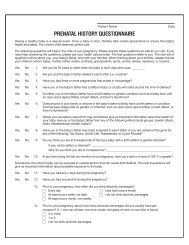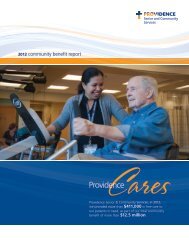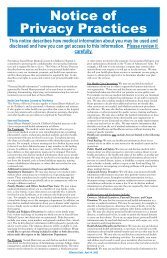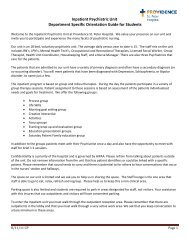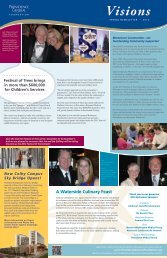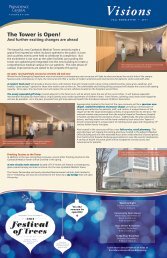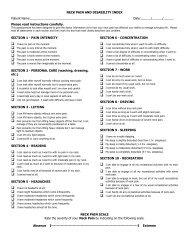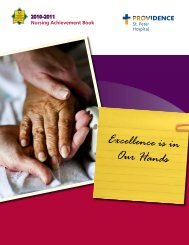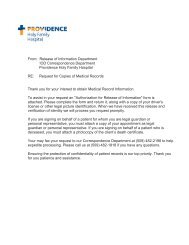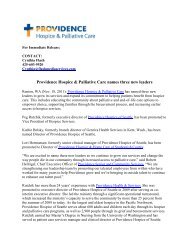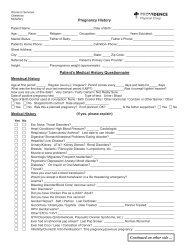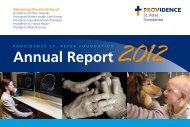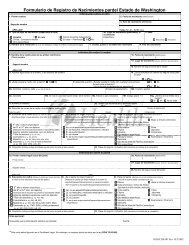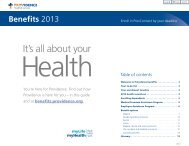Issue 3 - Fall - Providence Washington - Providence Health & Services
Issue 3 - Fall - Providence Washington - Providence Health & Services
Issue 3 - Fall - Providence Washington - Providence Health & Services
- No tags were found...
Create successful ePaper yourself
Turn your PDF publications into a flip-book with our unique Google optimized e-Paper software.
Yet, patients don’t always ask it. Untilrecently, heart experts had little researchon the subject, making it difficult to advisepatients. But this year, the American HeartAssociation released new guidelines aboutsex after a heart attack, and urged cardiologiststo discuss them with every patient.The good news? If you can handle moderateactivity like household chores without experiencingchest pain or shortness of breath, then yourheart is strong enough for sex.Talk with your doctor about cardiac rehabilitation,which strengthens your heart andrestores energy.3. “Will you know ifI don’t exercise?”While blood tests offer a preciselook at your eating habits,they reveal far less about yourexercise routine.Ultimately, lying to yourdoctors = cheating yourself.There isn’t any reason to lie toyour doctors. They want to help youachieve optimum health and prevent diseases,so it’s better to be honest with them so they canhelp you achieve healthy practices.4. “I survived, but whycan’t I shake these feelingsof depression?”Cardiologists are experts on the physical heart.But sometimes, they delve into the metaphoricalheart, too. It’scommon to feeldepressed and anxiousafter a heartattack or bypasssurgery. It’s vital thatyou seek treatmentfor depression, becausepatients who don’t are morelikely to have repeat heart attacks. You shouldn’tsuffer in silence. Talk with your doctor openly.5. “Is it possible to ‘cram’for my checkup?”It’s tempting to scarf salads and pop fish oilpills the week before a cholesterol test. But willyour cardiologist know you haven’t maintaineda healthy diet?The answer is yep—you’re busted.Your body is full of clues that help doctorspiece together a picture of your health. The mosttelling clue is a little thing called the hemoglobinA1c test, which measures the averageamount of sugar in your red blood cellsover the past 90 days.There are other clues. If youhaven’t been adhering to a diet,your cholesterol and bloodpressure levels will be proof.High-carbohydrate foodssuch as beer and chips make yourtriglycerides spike. And fastingglucose, which can signal diabetes,rises with poor eating habits.It’s temptingto scarf saladsand pop fishoil pills theweek beforea cholesteroltest ... but yourcardiologistwill know.CPR Update:Mouth-to-Mouth NotRequiredYou may have taken a CPR class back in college, but do you remember the steps? Is itmouth-to mouth and then three chest compressions? Or three breaths and one chestcompression?Fortunately, you may not have to remember at all.Research shows that a new method of resuscitation, called cardiocerebral resuscitation, iseasier to administer and more effective in responding to out-of-hospital cardiac arrest. It eliminatesthe need to blow air into the victim’s mouth, which can increase the chance for overresuscitation.The constant flow of blood to the heart and brain by performing continuous chestcompressions has been proven to minimize danger and increase survival. It also eliminatesthe concern of swapping germs or “catching” something by performing mouth-to-mouth.With the science supporting the effectiveness of compressions alone, experts hope the newguidelines will help more people will feel comfortable offering the lifesaving act of CPR.See how this new kind of CPR actually saved the life of a beloved doctor right here inSpokane. Read the full feature starting on page 24.<strong>Fall</strong> 2012 Heart Beat ● 13



